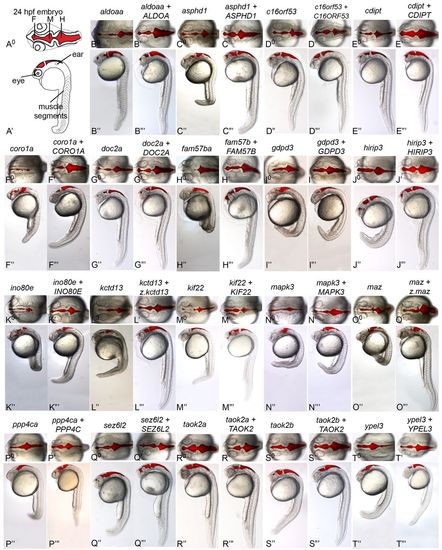Fig. 4
- ID
- ZDB-FIG-121205-7
- Publication
- Blaker-Lee et al., 2012 - Zebrafish homologs of 16p11.2, a genomic region associated with brain disorders, are active during brain development, and include two deletion dosage sensor genes
- Other Figures
- All Figure Page
- Back to All Figure Page
|
Human orthologs rescue zebrafish LOF embryos. Single-cell embryos were injected with MO, either alone or together with human or fish mRNA, and imaged at 24 hpf after injecting Texas Red dextran into the brain ventricles. The restoration of a LOF phenotype to normal by co-injection of the human homolog with a zebrafish LOF indicates functional equivalence of the human and zebrafish gene (orthology). kctd13 (L′ ′′-L′ ′′) and maz (O′ ′′-O′ ′′) LOF phenotypes were rescued by zebrafish but not human RNA. (B′ ′′-T′ ′′) Dorsal views and (B′′-T′′) lateral views of LOF embryos. (B′-T′) Dorsal views and (B′ ′′-T′ ′′) lateral views of LOF embryos plus rescue mRNA. Human RNAs co-injected for rescue are indicated by uppercase letters, except for z.kctd13 and z.maz, which refer to RNA from the zebrafish genes. The rescue experiments shown in D, E and G are from the experiment shown in Fig. 2; in other cases, the images are taken from different experiments, with data consistent to that shown in Fig. 2. Images are representative of two to four independent experiments per gene, with 40–194 embryos assayed in total per gene. Rescue of the abnormal LOF phenotypes was achieved in <50% or more of the embryos. Representative images are shown here and quantification is included in Table 3. F, forebrain ventricle; M, midbrain ventricle; H, hindbrain ventricle. |

